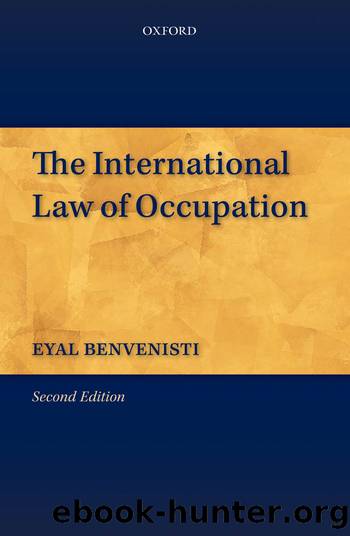International Law of Occupation by Benvenisti Eyal;

Author:Benvenisti, Eyal;
Language: eng
Format: epub
Tags: Cities and the American Revolution
Publisher: Oxford University Press
Published: 2012-08-14T16:00:00+00:00
9.3.2 The law of occupation in light of the occupation of Iraq
As acknowledged in both the occupants’ letter and the Security Council’s Resolution, the demise of the Iraqi regime did not affect the sovereignty and territorial integrity of Iraq. This confirmed instead the demise of the doctrine of debellatio, which would have passed sovereign title under such circumstances to the occupant.151 On the other hand, the total collapse of the Iraqi regime carried significant legal consequences. As recognized in the preamble to Security Council Resolution 1483, instead of restoring that regime’s institutions and respecting its laws, the Iraqi people were encouraged “freely to determine their own political future and control their own natural resources,… to form a representative government based on the rule of law that affords equal rights and justice to all Iraqi citizens without regard to ethnicity, religion, or gender.”
Resolution 1483 marks the first time the Security Council resorted to the concept of occupation to describe, authorize, and delimit the authority of foreign troops in control of enemy territory. The recognition of the applicability of the law of occupation refuted the claim that occupation as such is illegal and revived the neutral connotation of the doctrine, at least from a legal perspective. At the same time, the broad mandate recognized by the Security Council as pertaining to the occupants to transform Iraq into a market-based democracy, although commendable and probably lawful under UN Charter law, also tested the limits of the law of occupation and the Security Council’s own authority to shape the way the Iraqi people exercised their inalienable right to self-determination.
When drawing lessons from the occupation of Iraq for assessing the viability of the contemporary law on occupation it is important to emphasize the extraordinary factors that justify the extensive changes introduced by the occupant. These factors include on the “demand side” the dismal situation of a population devastated after years of wars and deprivations and the inter-ethnic strife which also reflected on the politics and the economy of the country, and on the “supply side” occupants which are accountable to the Security Council and which do not have territorial aspirations there. Under such strict conditions, the conflict of interests between occupied and occupier which the law of occupation seeks to regulate is of lesser concern than the immediate aid that individuals should receive in order to survive.
Download
This site does not store any files on its server. We only index and link to content provided by other sites. Please contact the content providers to delete copyright contents if any and email us, we'll remove relevant links or contents immediately.
The Rule of Law by Bingham Tom(1318)
The Holocaust: A New History by Laurence Rees(1235)
Political Theology by Carl Schmitt(1188)
The Social Animal by David Brooks(1118)
Restitution by Restitution(1115)
Pirates of Somalia by Jay Bahadur(1115)
A Practical Guide to International Arbitration in London by Hilary Heilbron(1083)
Coercing Virtue by Robert H. Bork(1027)
The Nuremberg Interviews by Leon Goldensohn(988)
Basic International Corporate Taxation by Sebastiano Garufi(928)
A History Of Thailand by Baker Chris(890)
Asian Waters by Humphrey Hawksley(878)
International Trade and Business: Law, Policy and Ethics by Gabriël Moens & Peter Gillies(869)
Blood Profits by Vanessa Neumann(867)
Spring Fever: The Illusion of Islamic Democracy by McCarthy Andrew C(866)
The Global Commons by Susan J. Buck(863)
Crimes Against Humanity: Historical Evolution and Contemporary Application by M. Cherif Bassiouni(793)
The Sovereignty of Human Rights by Macklem Patrick(792)
The Nuremberg Trials: The Nazis and their Crimes Against Humanity by Roland Paul(789)
